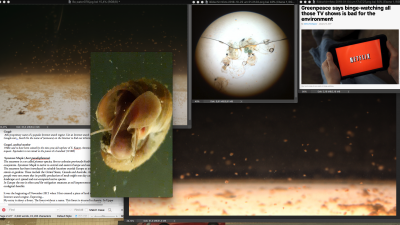
2019-2020 participants of the Research Lab are the media artist and freshwater ecologist Christina Gruber and the multimedia artist and Internet hack activist Antonio Zingaro. They will work with servus.at curator Davide Bevilacqua and the servus.at community on the environmental impacts of the Internet infrastructure and the “green” trends that are emerging in the marketing strategies of the largest Internet companies.
Both the digital and the analog world are based on water. For the digital cloud – a network of servers – water is needed to ensure fast streaming times, cool data center servers and supply power. The water required for this process is collected, heated, cooled and returned to the water cycle, which affects it. The water cycle is an ambiguous and perhaps overloaded concept, as is sustainability. How are we all connected, and are we really? Can a data center help us understand the deep relationships between ecosystems – on Earth and in the Cloud? And are there any? Or is it just another very well told story? Scrolling through the essentials of online marketing storytelling seems to be the next big thing. Without a story, your product won’t sell and at every corner there are experts to help create these masterpieces of craftsmanship. But don’t forget to be sustainable: #thereisonlyoneearth #savetheclimatenow #climatechangeisreal!
AMRO Research Lab 2019/2020 focuses on these topics. Based on the collection of examples of digital greenwashing propaganda, the attempt to recognize them and thus avoid them, and to dig even deeper and collect data in the local area. One example in particular: the use of water in so-called “green data centres”. The key questions are: Which effects do these material changes of water have on the ecosystem? How can we rethink the balance between the human needs of technology and the resources available in nature?
The research lab was structured in a long-term residence in the servus.at clubraum that was later extended in a research residence in Cyprus. Outcome of the process were: the participation at the conference of RIXC festival; a field trip looking at the internet infrastructure around Linz and its connection to water; the Symposium Vaping Networks at the Kunstuniversität Linz; a workshop about sustainable web design. Furthermore the research is included in the AMRO Festival 2020 Program.
Read More: research.radical-openness.org/2019
AMRO Research Lab 2019 was organized with
Christina Gruber (AT) is an artist and freshwater ecologist living and working in Vienna, Austria. She works at the intersection of art and science; her work deals with societal phenomena that shape our world. These relate to the Anthropocene, a concept that describes human beings as the main force changing the earth’s surface. Gruber investigates the effects humans have and had on the landscape and how they’ve shaped the earth’s surface. In the last years water is of special interest to her. She sees it as the element that all things on earth, including humans, have in common. It is the connector between stories of different places and layers, running through everything, from clouds to datacenters. www.christinagruber.net
Antonio Zingaro (IT) is a multimedia artist and internet hacktivist. After working as a filmmaker, he published R.T.F.M. (Read This Fucking Manual), a digital self-defence cross-media manual. His art practice explores the hidden layers of the internet as well as the relationship between intimacy, sexuality and technology. He is currently a MA candidate at the University of Art & Design Linz. www.forzantonio.it

